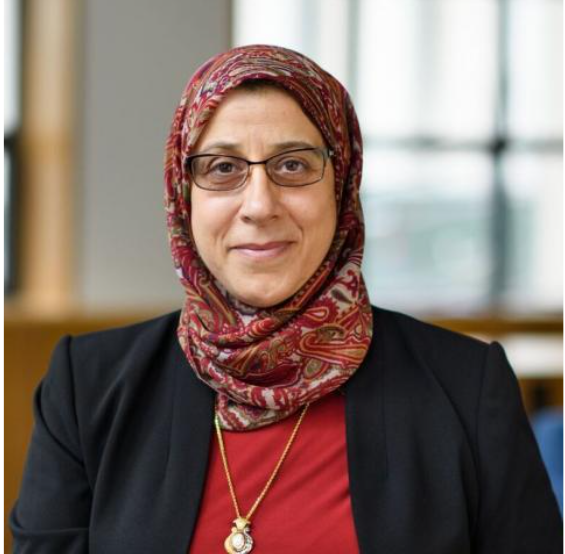Meet Our Jersey Muslim of the Month: Amaney Jamal
By: Alaa Essafi
We are proud to announce that our Jersey Muslim of the Month is Amaney Jamal! A Palestinian-American who moved to New Jersey in 2002, Jamal earned her undergraduate degree from the University of California, Los Angeles, and her Ph.D. in political science from the University of Michigan. She is also an award-winning author, her books include “Of Empires and Citizens: Pro-American Democracy or No Democracy at All” and “Barriers to Democracy: The Other Side of Social Capital in Palestine and the Arab World.”
In addition to her impressive list of accomplishments, Jamal was named the Dean of the Princeton School of Public and International Affairs in June and began her position on September 1. She plans to focus on three primary goals: ‘diversification, internationalization and the augmentation of the school’s policy‐making training.’
Regarding her dedication to promoting diversity, she said, “When we talk about diversity, what we’re asking for, demanding, or thinking about is making sure that our institutions of higher education reflect who we are as societies. If you think about the make-up of our societies and what our societies look like, we have an obligation, as these institutions, to make sure we’re representing all people.”
The importance of having a diverse lens in teaching policymaking is that it encourages different perspectives in addressing pressing world issues, she said, “Especially for policy schools where we are tasked with training the next generation of policymakers to make policy recommendations to solve some of the world’s most pressing problems, we want to make sure we have the best information at our disposal.”
She notes that “There is a risk, especially at these institutions; if only a certain segment of the population is represented in our instruction and you may, in our identity as an institution then we risk being a part of the problem.”
Her appointment, no doubt, has inspired Muslim students who often don’t have the opportunity to see fellow Muslims in positions of power or educational influences, thus fostering feelings of belonging and togetherness in a school environment that not often represents the Muslim population.
She reflected on the impact of her work in the educational sector, she said, “Since I’ve become a dean and in general, so many students have reached out to me to say that they hope my leadership will signal a change in times. Where I don't have to sit in a class where I’m the subject of the material being covered and I’m feeling very offended. This is such a common theme.”
Generally, the Middle East is quite a polarizing topic that has been infused with over politicization and is often perceived as a violent, perpetually unstable area.
She said, “I was very very frustrated as a graduate and undergraduate student in political science for a variety of reasons. People would make very inaccurate generalizations about Muslims and Arabs with no evidence coming out of a media environment that’s biased against Muslims.”
Thus, came the inception of The Arab Barometer, founded in 2006, a research-based organization that aims to provide effective, accurate research, survey findings, etc. concerning the MENA (the Middle East & North Africa) regions. Amaney Jamal serves as a principal investigator among a cohort of other experts and scholars both in the academic world and political setting. Her mission is to equip the Western World or any relevant audience with accurate data on the Arab world with the help of the Arab public to combat misconceptions or unreliable perceptions of the MENA region purported by Western media. Furthermore, their website provides several annual survey reports broken down by specific country and is available for scholarship, policymakers, civil society leaders, governments in the Middle East, research think tanks, etc.
Jamal further explains the climate which inspired her to explore her options to address these rampant misconceptions, she said, “Everyone was throwing around the term, back in the day, after 9/11, the “Arab street”. As if there is one monolithic ‘Arab street’ and that they all conform to the same attitude. The idea is that the ‘Arab street’ clearly supports terrorism, the ‘Arab street’ clearly is not doing enough to eradicate terrorism. So, let’s show what Arab public opinion really looks like.”
The surveys and research conducted by the Arab Barometer are used by civil organizations in the Middle East as well as mainstream media outlets like BBC Arabic. She said, addressing the impact of the services the Arab Barometer offers, “I do believe that having this accurate repository of data improves everyone’s interactions with the Arab world, but also it’s good for Arabs to know what their own populations are thinking. In that sense, I think it’s a win-win for everyone.”
In her position as an educator and active member of the Muslim community, she also aims to empower the younger generations to embrace their Muslim identity. She said, “Each and every one of us has a role and obligation to use our stories, our data, and representations of who we are and make sure we’re getting that out in the public sphere.”
To check out the work they’re doing, visit the Arab Barometer website here!
